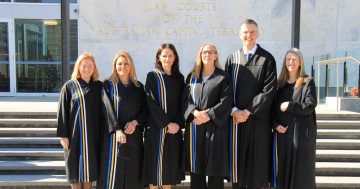
Josh Byrnes wants to use his story to make the criminal justice system better for child sex abuse survivors. Photo: Claire Fenwicke.
Josh Byrnes didn’t have to listen to his abuser being described as a “good person” during his sentencing for child sex offences – but it’s not an experience he would wish on anyone.
That’s why the Bungendore man joined the Your Reference Ain’t Relevant campaign, which is advocating to remove the use of good character references for all convicted child sex abusers in the ACT.
His decades-older second cousin abused Josh from the time he was 11 until he was 19. Given his abuser was also a Catholic priest, Josh was treated as an institutional sexual abuse survivor, and that’s how his abuser was sentenced.
Under laws in both NSW and the ACT, good character references cannot be used if the perpetrator used their standing in society to access their victims, such as a teacher or priest. However, if your abuser isn’t in a specific profession or is a family member, good character references can be taken into consideration during sentencing.
It’s something Josh wants changed across the board.
“I’d had a lifetime of people telling me what an awesome person [my abuser] was, and the fact of the matter is … if he wasn’t a parish priest, if he was just my second cousin, there would have been a huge chance where he would have been able to use character references a lot more, because of those 15 words we’re trying to remove from the [ACT] legislation,” he said.
The 15 words they want deleted are “to the extent that the offender’s good character enabled the offender to commit the offence”, meaning good character couldn’t be considered during the sentencing of any child sex offender.
“When you sit there and when you listen to a perpetrator be spoken about in a way that tends to diminish the impact their behaviour has had on survivors, that’s where it can get re-traumatising.
“Listening to somebody [in court] saying what an amazing person [the abuser] is, it’s damaging, it lasts a lifetime and it shouldn’t happen, and that’s why we want to stand up and push for these changes.”
Josh says he’s one of the lucky ones, given his case resulted in a conviction.
His abuser pleaded guilty to two offences on the day his trial was meant to begin, after three-and-a-half years of court hearings to reach that point.
Josh described his abuser as someone who was his self-appointed mentor when his parents’ marriage was falling apart, who took him to movies and football games and generally looked out for him.
But Josh said this is what perpetrators want people to see.
“[He] made me feel like I was really loved and cared for, where behind the scenes he was actually very selfish … he was very conniving and manipulative and there was a lot of emotional blackmail involved,” he said.
“I had people come to me and say, ‘You’re really lucky he’s taken that interest in you, you’re really lucky to have someone like that who takes care of you’ – so in everyone’s eyes, he was such a lovely guy.”
Josh understands the court system needs to weigh up many elements, and lawyers and justices are confined by the law.
However, he feels the human element is lost in many aspects, and when it is there, it’s swayed towards the rehabilitation and prospects for the abuser rather than rehabilitating and healing the survivor.
“People who say [it’s so out of character] don’t understand the very basis of grooming: the whole idea is to get themselves in a position where they’re not suspected, and there’s no suspicion that their behaviour is anything but genuine, good willed or trying to look out for somebody,” Josh said.
“People who say good character references should be part of the sentencing procedure clearly don’t understand how it’s used by these people to get into the position [where they can offend].
“The whole idea of the way a perpetrator behaves is to avoid suspicion … but behind closed doors, they’ve been abusing someone, doing heinous things, physically, emotionally.”
Several proposed reforms relating to the prosecution of alleged sexual offences in the ACT have been announced in the past month.
The presumption of bail has been switched to neutral for some serious sexual offences, while talks are also underway for a specialist sexual offences court.
The ACT Bar Association had commended ongoing efforts to reform criminal law to encourage and increase reporting, make the justice process more understandable and easier to navigate for vulnerable witnesses, and minimise the potential re-traumatising of complainants of sexual offences.
President Marcus Hassall said while the association was open to considering further reforms, he warned it was critical law reform was undertaken “soberly, carefully and with an eye to potential injustices”.
“Reform must be undertaken in a manner which does not, deliberately or inadvertently, undermine fundamental principles like the presumption of innocence,” he said.
“Human experience shows that a wide range of scenarios can and do come before the courts – including cases where the only proper outcome is an acquittal.
“It is vital that the law be capable of and fashioned to achieve justice, as best it can, in all cases and for all parties.”
He suggested the new proposals may be suited for consideration by the Law Reform and Sentencing Advisory Council, which is expected to begin work this month.
An e-petition is open until 1 February 2024 to remove good character references for convicted child sex offenders, which the ACT Government can then consider.



















Just cut the tram and give us proper healthcare! View